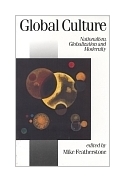|
||
• wydawnictwa polskie
• Zamów informacje o nowościach z wybranego tematu • kontakt
• Cookies na stronie |
GLOBAL CULTURE NATIONALISM GLOBALIZATION AND MODERNITYFEATHERSTONE M.wydawnictwo: SAGE , rok wydania 1999, wydanie Icena netto: Global Culture Nationalism Globalization and Modernity Recent decades have seen intensified flows of people, commodities, money, ideas, information and images on a global level. Is a unified world culture emerging? And if so, how does this relate to existing cultural divisions and to the autonomy of the nation state? In this book leading social scientists from many countries analyse to what extent we are seeing a globalization of culture. Differing explanations are offered for trends towards global unification, and their relation to an economic world-system. The contributors explore the emergence of 'third cultures', such as international law, the financial markets and media conglomerates, as elements which transcend the boundaries of the nation state. Will the intensification of global contact produce increasing tolerance of other cultures? Or will an integrating culture produce sharper reactions in the form of fundamentalist and nationalist' movements? As well as examining the extent, causation and consequences of global homogenization, the authors consider its implication for the social sciences. To what extent can sociology still retain the notion of the nation-state society as its basic unit? Cultural globalization is widely perceived but as yet little analysed. This innovative volume will appeal to a wide market in the social sciences and humanities with particular interest to teachers and students of sociology, cultural studies, anthropology and political science. Global Culture is being published simultaneously as volume 7, issue 2/3 of Theory, Culture <& Society. Mike Featherstone is Reader in Social Studies at Teesside Polytechnic. He has edited Theory, Culture & Society since its foundation. His publications include Postmodernism (edited, 1988), and Surviving Middle Age (with Mike Hepworth, 1982). He has written extensively on contemporary cultural theory and on the life course. Księgarnia nie działa. Nie odpowiadamy na pytania i nie realizujemy zamówien. Do odwolania !. |


